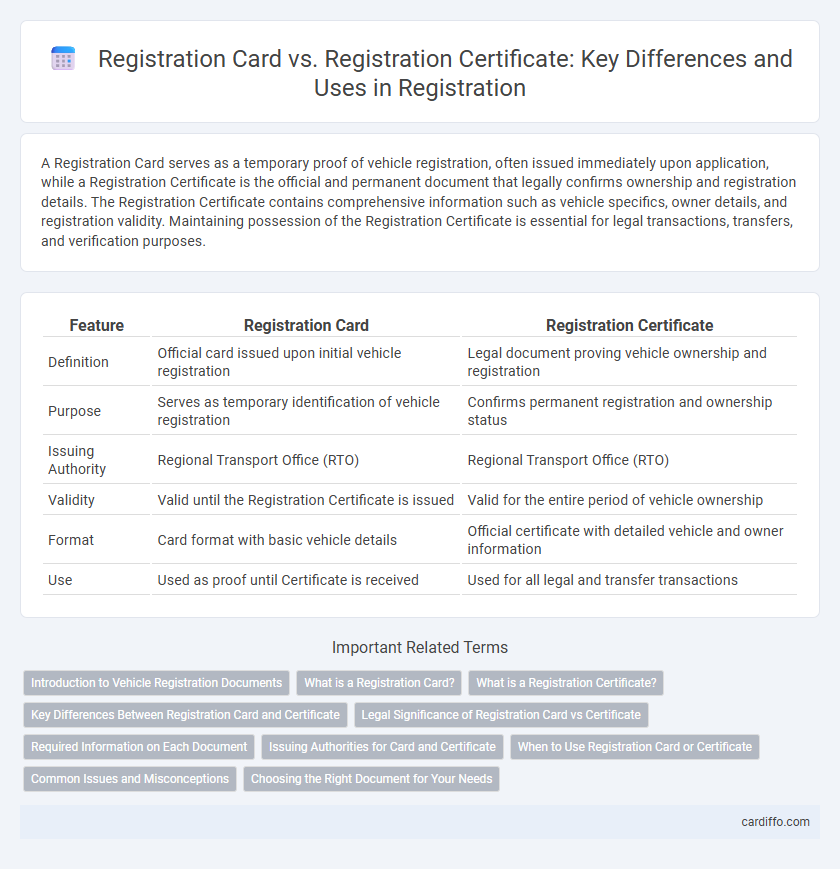A Registration Card serves as a temporary proof of vehicle registration, often issued immediately upon application, while a Registration Certificate is the official and permanent document that legally confirms ownership and registration details. The Registration Certificate contains comprehensive information such as vehicle specifics, owner details, and registration validity. Maintaining possession of the Registration Certificate is essential for legal transactions, transfers, and verification purposes.
Table of Comparison
| Feature | Registration Card | Registration Certificate |
|---|---|---|
| Definition | Official card issued upon initial vehicle registration | Legal document proving vehicle ownership and registration |
| Purpose | Serves as temporary identification of vehicle registration | Confirms permanent registration and ownership status |
| Issuing Authority | Regional Transport Office (RTO) | Regional Transport Office (RTO) |
| Validity | Valid until the Registration Certificate is issued | Valid for the entire period of vehicle ownership |
| Format | Card format with basic vehicle details | Official certificate with detailed vehicle and owner information |
| Use | Used as proof until Certificate is received | Used for all legal and transfer transactions |
Introduction to Vehicle Registration Documents
Vehicle registration documents primarily include the Registration Card and Registration Certificate, each serving distinct purposes in vehicle ownership verification. The Registration Card acts as a temporary proof of registration, often issued immediately after vehicle purchase, while the Registration Certificate is the official legal document confirming permanent registration with relevant transport authorities. Understanding the differences between these documents is crucial for compliance with traffic laws and facilitating ownership transfers.
What is a Registration Card?
A Registration Card is an official document issued by the relevant authority confirming the registration of a vehicle or entity, typically serving as a portable proof of registration. It contains essential details such as the registration number, owner's name, and validity period, enabling quick verification during inspections or checkpoints. Unlike a Registration Certificate, which is often a more detailed and permanent record, the Registration Card is designed for convenience and immediate proof of registration.
What is a Registration Certificate?
A Registration Certificate is an official document issued by a government authority that verifies the legal registration of a vehicle, individual, or entity. It serves as proof of ownership or compliance with regulatory requirements and contains essential details such as registration number, date of registration, and owner information. Unlike a Registration Card, which is often a portable identification card, the Registration Certificate is a comprehensive legal document required for legal verification and transaction purposes.
Key Differences Between Registration Card and Certificate
Registration Card typically serves as a proof of enrollment or membership with minimal details, while Registration Certificate provides official validation with comprehensive information including registration number, date, and entity details. The card is often issued immediately for quick identification, whereas the certificate is a formal document used for legal and administrative purposes. Understanding these key differences is crucial for compliance in institutional, vehicular, or organizational registrations.
Legal Significance of Registration Card vs Certificate
The Registration Card serves as a temporary proof of registration, enabling immediate compliance while the permanent Registration Certificate is processed. The Registration Certificate holds greater legal significance as it acts as the definitive document of ownership or registration, often required for legal and official purposes. Courts and authorities typically recognize the Registration Certificate as the primary evidence in disputes or transactions, whereas the Registration Card is treated as provisional documentation.
Required Information on Each Document
A Registration Card typically contains essential personal details such as the registrant's name, photo, address, and a unique registration number for quick identification. A Registration Certificate includes more comprehensive information, including vehicle or property specifics, registration validity dates, and official authorization signatures or stamps. Both documents require accurate data to ensure legal verification and streamlined record-keeping during the registration process.
Issuing Authorities for Card and Certificate
A Registration Card is typically issued by local municipal authorities or regional registration offices responsible for resident identification, while a Registration Certificate is often issued by specialized government departments such as the motor vehicle department or immigration offices depending on the context. The Registration Certificate requires verification of specific criteria like vehicle ownership or legal status, necessitating issuance by a dedicated regulatory body. Understanding the issuing authorities helps differentiate the purpose and legal significance of both documents in official records.
When to Use Registration Card or Certificate
Registration Card is typically used as a temporary proof of vehicle registration immediately after purchase, allowing legal operation on roads before the official documentation is issued. Registration Certificate serves as the permanent legal document confirming ownership and detailed vehicle information, required for long-term identification, sale, or transfer of the vehicle. Use the Registration Card during the initial processing period and switch to the Registration Certificate for all formal and legal vehicle-related procedures.
Common Issues and Misconceptions
Registration cards and registration certificates are often confused due to their similar names, but they serve distinct purposes; the card typically acts as a proof of registration for vehicles, while the certificate provides detailed legal ownership information. Common issues arise when individuals mistake the registration card for legal proof of ownership, leading to challenges during vehicle transfers or inspections. Misconceptions also include assuming both documents are interchangeable, causing delays and complications in administrative processes.
Choosing the Right Document for Your Needs
Selecting between a Registration Card and a Registration Certificate depends on your specific requirements and the document's intended use. A Registration Card is typically a smaller, more portable proof of registration used for quick identification, while a Registration Certificate serves as an official, detailed legal document verifying ownership or registration status. Evaluate whether you need a convenient, easily accessible form of identification or a comprehensive certificate for legal or administrative purposes to make the best choice.
Registration Card vs Registration Certificate Infographic

 cardiffo.com
cardiffo.com